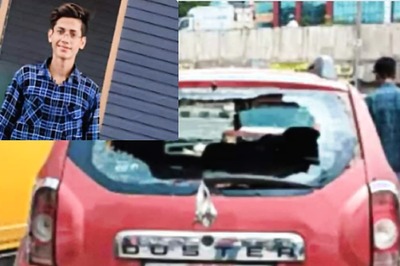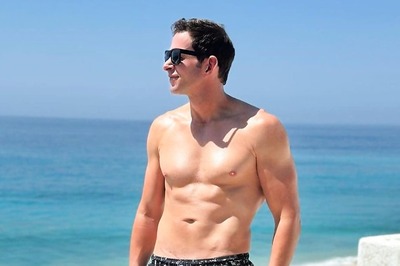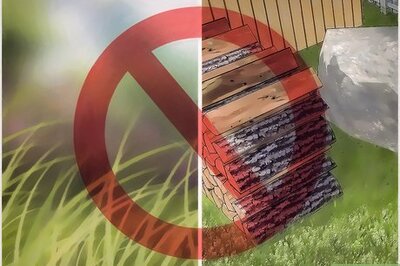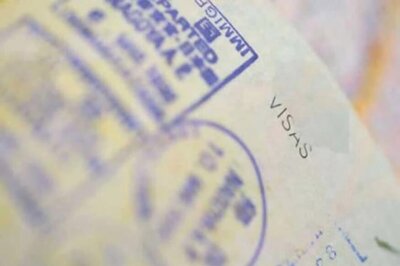
views
Diplomats from five key nations kicked off talks on Tuesday on a Western-drafted UN Security Council resolution to eliminate Syria's chemical weapons.
However, France and Russia clashed over Moscow's insistence that Syrian President Bashar al-Assad is innocent in an August 21 poison gas attack on civilians.
The negotiations in New York among the American, British, French, Russian and Chinese diplomats focused on a draft resolution on Syria's chemical weapons arsenal to be put before the 15-nation UN Security Council.
The US-British-French draft is intended to support an American-Russian deal reached in Geneva last Saturday calling for Syria to account for its chemical weapons within a week and for the removal and destruction of the arsenal by mid-2014.
UN diplomats said it remained unclear when a vote on the resolution could take place. The current draft leaves the door open to the use of force in the event of non-compliance by Syria, though diplomats said Russia would almost certainly demand such provisions be deleted.
Meanwhile, Israel, Syria's neighbor that has been warily eyeing a civil war that has killed 100,000 people since 2011, shifted from its non-committal public stance and said it wanted to see Assad toppled.
President Barack Obama, who had threatened US military strikes in response to the August attack, said even with the deal to get rid of Syria's chemical weapons, ultimately there must be a political transition in Syria in which Assad gives up power.
"Keep in mind that it's very hard to imagine that civil war dying down if, in fact, Assad is still in power," Obama told the US Spanish-language network Telemundo.
Obama said it remains his goal to "transition" Assad out of power in a way that protects religious minorities and ensures Islamist extremists are not gaining ground in Syria.
The meeting of diplomats from the five permanent, veto-wielding powers of the Security Council came a day after UN investigators confirmed the use of sarin nerve agent in the August 21 attack.
The United States, Britain and France said the report proved beyond any doubt that Assad's forces were responsible.
The UN report's findings triggered sharp disagreement at a meeting in Moscow of the top diplomats from Russia and France. Russia has been Assad's most powerful backer during the civil war, delivering arms and - with China - blocking three UN resolutions meant to pressure Assad.
Sitting beside French Foreign Minister Laurent Fabius at a news conference, Russian Foreign Minister Sergei Lavrov said the report produced no proof that Assad's troops carried out the attack and that Russia still suspected rebel forces did it.
Fabius took the opposite view, saying the report left no doubt that Assad's forces were to blame for the attack that the United States says killed more than 1,400 people. Washington has blamed Syrian government forces. Assad's government blames the rebels.
'NO DOUBT'
"When you look at the amount of sarin gas used, the vectors, the techniques behind such an attack, as well as other aspects, it seems to leave no doubt that the regime is behind it," Fabius said.
Lavrov acknowledged that the investigators' report proved that chemical weapons had been used but that "there is no answer to a number of questions we have asked," including whether the weapons were produced in a factory or home-made.
"We have very serious grounds to believe that this was a provocation," Lavrov said.
Lavrov said the UN report should be examined not in isolation but along with evidence from sources such as the Internet and other media, including accounts from "nuns at a nearby convent" and a journalist who had spoken to rebels.
"We want the events of August 21 to be investigated dispassionately, objectively and professionally," he said.
Diplomats in New York said Russian UN Ambassador Vitaly Churkin questioned some of the findings in chief UN chemical investigator Ake Sellstrom's report at a closed Security Council meeting on Monday. Churkin, they said, asked Sellstrom to describe the quality of the weapons that dispersed sarin.
"The rockets found on the site were professionally made and, according to Dr. Sellstrom, they bore none of the characteristics of jerry-rigged, improvised weapons," US Ambassador Samantha Power told the UN General Assembly.
"They had sophisticated barometric fuses to disperse the nerve agent in the air and not on impact," she said on Tuesday. "This was a professionally executed massacre by the regime, which is known to possess one of the world's largest undeclared stockpiles of sarin."
Britain's UN Ambassador Mark Lyall Grant said the diplomats from United States, Russia, Britain, France and China - known as the "P5" - would report back to their capitals and reconvene on Wednesday.
'RUSSIA STANDING BY US'
In Washington, US Secretary of State John Kerry called for a UN resolution with the strength to force compliance from Assad on chemical weapons.
"That will happen only with the United Nations passing a strong resolution. It will happen with the enforcement of the world, with Russia standing by us in this effort, and it will happen, finally, because Assad lives up to what he has agreed to do," Kerry told reporters.
The current US-British-French draft, diplomats said, would condemn and blame Assad for the use of chemical weapons and refer the Syrian civil war to the International Criminal Court for possible war crimes indictments.
The draft is also written so that its provisions are under Chapter 7 of the UN charter, which covers the Security Council's authority to enforce its decisions with measures such as sanctions or the use of force.
Diplomats said Russia would likely demand most Chapter 7 references be deleted, meaning any attempt to punish Syria for non-compliance would require a second resolution authorizing punitive measures.
Michael Oren, Israel's ambassador to the United States, made clear his nation's shift in views on the civil war in an interview with the Jerusalem Post. Even Assad's defeat by al Qaeda-aligned rebels would be preferable to Syria's current alliance with Israel's arch-foe Iran, Oren said.
"We always wanted Bashar Assad to go, we always preferred the bad guys who weren't backed by Iran to the bad guys who were backed by Iran," Oren said.
"The greatest danger to Israel is by the strategic arc that extends from Tehran, to Damascus to Beirut. And we saw the Assad regime as the keystone in that arc," Oren said.
Israel and Syria are old enemies, but a stable standoff has endured between them during Assad's rule. Israel even pursued peace talks with him in hope of divorcing Syria from Iran and Iranian-sponsored Hezbollah guerrillas in neighboring Lebanon.
Violence flared anew along Syria's tense border with Turkey as a car bomb exploded on the Syrian side of the main Bab al-Hawa border crossing, killing at least seven people and wounding 20, the Turkish news agency Dogan said.
The car bomb exploded a day after Turkish forces shot down a Syrian helicopter that had entered Turkey's airspace. The Syrian army accused the Turkish government, which backs the uprising against Assad, of trying to escalate tensions along the border.




















Comments
0 comment